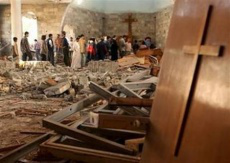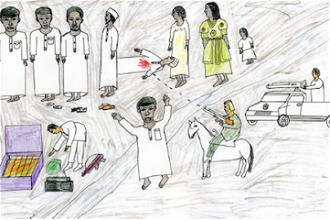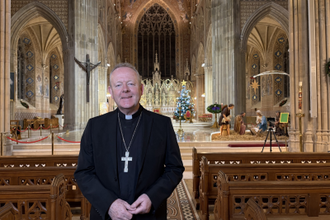Viewpoint: What future do Christians have in the Middle East?

Christmas Day 2013, Baghdad church
I met Saad on a sweltering hot day, 90 degrees in September no less, just as we were both leaving Pope Benedict XVI’s Papal Mass in Beirut in 2012. I had spotted him amid the tens of thousands in attendance that day because he had an Iraqi flag draped across his shoulder.
Saad told me he was one of a group of 21 Chaldean Catholics who had travelled from Kirkuk in Iraq to attend the Mass.
Chaldeans are one of the oldest Christian communities in the world and along with other Iraqi Christians and Muslims were suffering persecution in the continuing bloody aftermath of the 2003 US-led invasion of the country.
He was in a buoyant mood that day in Beirut.
Despite what he described as “dangerous journey” from his home in Northern Iraq to Beirut, and the prospect of an equally dangerous return trip, he told me that he was “lifted” by seeing the Pope. “To be so near the head of our church is very special for us. The Pope's visit supports Christians in Iraq and across the Middle East" He said: "It means we are not alone in this part of the world, it reminds us that there are many of us and shows us we can support each other and express our faith openly."
As I write this I have no idea if Saad is still alive. The situation in Iraq that he described to me that day has worsened significantly. Kirkuk, Saad’s hometown, has seen sporadic clashes on its outskirts as the Islamic State of Iraq and Syria (ISIS) the Sunni extremist insurgent group which has conquered large swathes of northern and western Iraq and northern and eastern Syria, stepped up its bloody campaign last month.
Kirkuk remains in Kurdish hands, but the many Christian villages to its south have fallen under ISIS control. The shelling of the village of Hamdaniya sparked a flight by thousands of Christians from it and other nearby villages to take sanctuary in the relatively safe Kurdish controlled territory.
ISIS has now declared a caliphate over the region and changed its name to Islamic State. Wherever its writ runs, summary executions are commonplace. Shootings and beheadings have been filmed with glee as ISIS asserts its control over the areas it has captured.
At Deir Hafer in the east of Aleppo province in Syria, ISIS was reported to have crucified eight men in the main square of the village. The men were understood to be rebels fighting against both Syrian President Bashar Assad and jihadist groups including ISIS.
Last month the march of ISIS effectively ended more than 1600 years of Christian worship in Mosul in northern Iraq after it annexed the city.
As it did when it took over the northern Syrian city of Raqqa, ISIS demanded a levy in gold from Christians who had failed to flee and forced them to accept stringent curbs on their worship - known as dhimmi status, effectively suppression as a “protected” minority - or face death.
In essence Christians are offered three choices when ISIS arrives: convert to Islam, or accept ISIS' conditions, or face being killed.
In addition to the levy, dhimmitude means Christians are prohibited from renovating damaged churches, ring church bells or display crosses or other religious symbols in public.
An ISIS statement issued last month when it took control of Raqqa said: “If they [Christians] reject, they are subject to being legitimate targets, and nothing will remain between them and ISIS other than the sword.”
Needless to say dhimmitude only offers the barest protection. If Christians find they can no longer pay the levy, or if they cause some other offence to ISIS placemen on the ground, they are still likely to find little between them and the sword.
Of course, ISIS’ reign of terror does not impact on Christians alone, moderate Shia and Sunni Muslims suffer equally from their barbarism and litany of evil.
But this latest violence has again raised the question of how long Christians can remain in the region where the word of Christ was first heard as the forces of religious extremism and sectarianism intensify?
In 2012 it was estimated the Christian population of the Middle East was around five per cent, down from around 20 per cent eighty years earlier. Against the backdrop of the current violence in Syria and Iraq, it is likely that figure is even lower today.
The spill over from the turmoil in Iraq and Syria has also seen threats made against Christians in Lebanon, where Christians form a sizeable minority and under the country’s sectarian-based power sharing system have substantial political representation.
A militant group called the Free Sunni Brigades threatened churches in the Bekaa Valley in the east of Lebanon. Few in Lebanon’s Christian community take the threat seriously, but for some it underscores why so many Christians, particularly the young, are leaving the Middle East.
Last month the head of the Chaldean-Catholic Church, Patriarch Louis Raphael I Sako, expressed his fear that Christian life will eventually come to an end in the region.
“In ten years there will perhaps be 50,000 Christians left in Iraq. Prior to 2003, this figure was about 1.2 million. Within ten years we have shrunk to a community of perhaps four to five hundred thousand faithful,” he said.
He added: “When I was in Turkey recently ten Christian families from Mosul arrived. And in the space of only one week twenty families left Alqosh, a completely Christian town not far from Mosul. This is very serious, we are losing our community.”
Like many regional observers, the Patriarch believes the latest violence has sounded the death knell for a united Iraq.
The current crisis has afforded Iraq’s Kurds in particular the political and military leverage to achieve a long held desire to establish their own state in the oil-rich region of Kirkuk.
Even before ISIS’ rampage Christians have been fleeing to the area controlled by the largely autonomous Kurdistan Regional Government to escape the Pandora’s box of violence unleashed by the invasion in 2003.
Although Washington insists that “a united Iraq is a stronger Iraq,” insiders believe a “Plan B” is now being considered which would see an independent Kurdistan established as western political counterweight to Sunni states that have supported Islamist extremists, such as Saudi Arabia and Qatar, and the Shia extremists in the region supported by Iran.
It could also provide a more permanent and stable home for at least some of the Christians in the Middle East.
“The future may lie in Kurdistan,” said the Patriarch. “Many Christians are already living there after all. But there are also many who live in Baghdad, and there are also some in Basra in the Shiite south. We must wait and see how things develop.”
When Benedict came to Lebanon on the day I met Sadd, he made a special plea for Christians to remain in the Middle East and help build a "better society" for all. As the Patriarch points out, being forced to live in what amounts to proctectorates will not fufil that ambition.
During his recent trip to Israel, his successor, Pope Francis, made a powerful gesture in support of Palestinians when he prayed and rested his head against the giant Israeli separation barrier that divides Bethlehem from Jerusalem.
Perhaps it is time to make a similar gesture in support of Christians.
As Saad said on that joyous day in Beirut, seeing the Pope stand on Middle East soil was evidence that Christians in the region were not alone in the world and could " express our faith openly". Whatever future Christians have in our spiritual homeland, and one hopes it is not restricted to ghettoised enclaves, the Church in Rome must do more to show its support for them.
Michael Glackin is a Catholic journalist who has worked for several years in the Middle East.


















